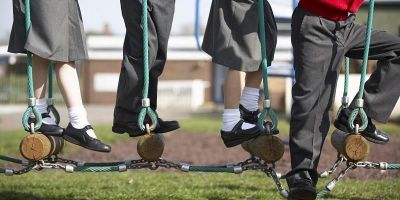Major drive to improve life chances of Bradford children launched

Civic leaders have pledged to take on a new challenge to boost social mobility for Bradford's children.
In what is described as a bold 20-year ambition, the aim is to tackle inequalities so every child has the opportunity to be their best and have the chance to lead a fulfilling and satisfying life.
Run by a partnership of civic and community leaders called the Alliance for Life Chances, it will build on the achievements of the Bradford Opportunity Area, which was launched by the Government five years ago in response to low levels of social mobility and lower than average educational attainment. The Bradford Opportunity Area programme has now ended.
An evaluation of the outcomes of the Bradford Opportunity Area reveals it has had an impact on the lives of thousands of children in the district. Among the notable achievements was the creation of the Centre for Applied Education Research - a partnership involving the University of Leeds and other educational, business and health organisations to introduce the latest research into schools to improve learning.
The reality is that far too many children in Bradford are on a trajectory which will see them fail to achieve their best
Mark Mon-Williams, Professor of Psychology at the University, is a member of the Alliance for Life Chances partnership board and also on the steering committee of the Centre for Applied Education Research. He said: “The reality is that far too many children in Bradford are on a trajectory which will see them fail to achieve their best – at school, at work and in relationships – and will be a greater risk of ill health, both mental and physical.
“The reasons why are complex and no single organisation can provide the solutions, but in Bradford there is a recognition that the work must start in schools, and we have shown through the Bradford Opportunity Area that the right interventions can produce real benefits.
“The challenge now is to take our approach to the next level.”
Pledges to improve life
At a launch event at Salts Mill in Saltaire, members of the Alliance for Life Chances signed a giant pledge card to say they would actively work towards removing the barriers that prevent children from achieving their full potential.
The pledge says signatories will:
- Offer support to increase the range of opportunities available to children and young people through health and education initiatives, activities and projects;
- Champion the need to do more to tackle inequalities and help build a coalition of support for our shared vision;
- Engage in meaningful conversations and evidence-led solutions to tackle health and education vulnerabilities and inequalities in Bradford.
A number of key projects will play a part in the drive for great social mobility in future years.
The pioneering Born in Bradford project – which is tracking the health and wellbeing of the city's younger children – is being extended to include adolescents and young people. Information from the project will help identify ways that families can be better supported to improve social mobility.
Funding is also being sought for community play hubs where children can play and explore in a way that enables them to hit development milestones and improve their readiness for school.
Scientists are also using data analysis to identify areas of the Bradford district where needs are the greatest. Called Act Locally, it will enable agencies to target services in those localities and to tailor specific policies to bring about change.
Legacy of the Bradford Opportunity Area
The Bradford Opportunity Area operated through a programme board to identify ways of strengthening school leadership; improving literacy and learning; giving pupils access to rewarding careers; and using the power of research to boost learning.
Thirty-nine schools in the district that were classified as either “inadequate” or “requiring improvement” were able to raise the outcome of their next OFSTED inspection by at least one grade – and 180 families received the support of mentors. Schools also benefited from specialist mental health practitioners.
The Centre for Applied Education Research has funded 20 projects – highlights include interventions that have:
Enabled experts to create resources teachers can use to help children who have a poor working memory. A working memory is the short-term memory that is essential to cognitive tasks and is critical to learning;
Resulted in new tests to identify children at key stage 3 – those aged 11 to 14 – who require additional support with language development;
Ensured children’s vision in primary schools was monitored and those with poor eyesight were able to get free glasses;
Introduced initiatives to help younger children with their handwriting.
In conclusion, the evaluation, by the Bradford Institute for Health Research, found that “...the Bradford Opportunity Area has laid a solid foundation for future whole system approaches to improving education and social mobility for the children and young people within the Bradford District and beyond.
“Nevertheless, there is great need to build on the platform created by the Bradford Opportunity Area to tackle the endemic problems facing children and young people within the Bradford District.”
For more information
For more details, please contact Media Relations at the University of Leeds via pressoffice@leeds.ac..uk
Top picture courtesy of Hana Kesedzic.




